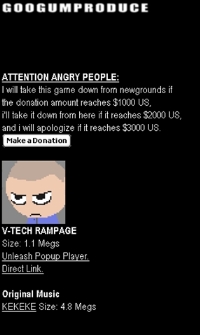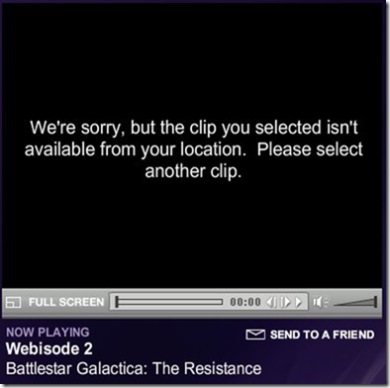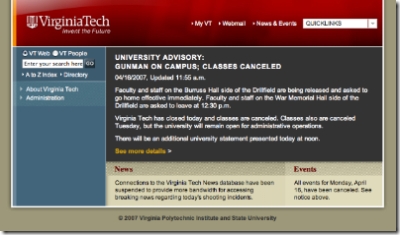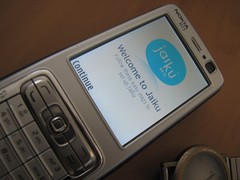Home » participatory culture (Page 29)
Category Archives: participatory culture
V-Tech Massacre: Tasteless Videogame based on the Virginia Tech Massacre
 A 21-year old Sydney man, Ryan Lambourn, has sparked outrage by creating a game based on the Virginia Tech Massacre. The game, called V-Tech Rampage, is far from technically impressive, but has nevertheless understandably upset quite a few people. One of the real difficulties is that while there have been a number of important political games and simulations which have tried to ‘speak’ about political issues (from September 12 to Donkey John to World Without Oil) this game – if it does have a point – really doesn’t make that clear. Over at Joystiq, the creator of the game based on the Columbine Massacre is quoted, citing his disappointment with the V-Tech game:
A 21-year old Sydney man, Ryan Lambourn, has sparked outrage by creating a game based on the Virginia Tech Massacre. The game, called V-Tech Rampage, is far from technically impressive, but has nevertheless understandably upset quite a few people. One of the real difficulties is that while there have been a number of important political games and simulations which have tried to ‘speak’ about political issues (from September 12 to Donkey John to World Without Oil) this game – if it does have a point – really doesn’t make that clear. Over at Joystiq, the creator of the game based on the Columbine Massacre is quoted, citing his disappointment with the V-Tech game:
Danny Ledonne, creator of Super Columbine Massacre RPG, writes on Lambourn’s site, “It would appear to me that Ryan has no intention of doing much other than making money and gaining immediate recognition after the Virginia Tech shooting. Inevitably, comparisons between SCMRPG and VTech Rampage are being made right now. Some bloggers despise both games equally whereas others recognize a level of commentary that SCMRPG attempted which was not evident in VTR. For myself I wish to point out that SCMRPG was never a for-profit endeavor and thus I never posted statements like that which is on the VTR game’s homepage”
Adding fuel to the Lambourn posted a notice say he would only remove the game if he received $2000 in donations. This sparked even more vitriolic comments on the game, but in those comments Lambourn defends the donations statement, say it was a further aspect of satire:
PiGPEN – May 15th 2007
Danny, the donation thing is there as a joke against all the people commanding me to take my game down. I didnt think anyone would donate money to it and so far my paypal account has proven me right (BUT I COULD USE SOME FUCKING MONEY THANKS!).
And i’d appreciate if you didnt use the name “Ryan”. That name is reserved for my close friends and family… i cant help the people that gleaned personal information from my website but i would hope you would have the courtesy to not disrespect me in such a manner on my own website…Danny.
Of course, the irony of courting controversy and then being surprised when it results in negative public sentiment (and the post of Lambourn’s full name, address and phone number in numerous locations online) is pretty thick. On the web, even thought two wrongs don’t make a right, they’re never far from each other!
See The Age for more details.
Update (17 May, 2:25pm): The ‘official’ version of the game hosted by Lambourn (and this whole website) have been taken down. (That said, given the nature of digital culture, if anyone looked I’m sure they’d find another copy somewhere…) Lambourn’s website now sports a “This Account Has Been Suspended” notice.
Update 2 (4 June 2007): After reviewing the case, Australia’s Office of Film and Literature Classification gave the game an MA15+ rating, not banning the game as had been suggested.
Six Twitter Questions
Last week danah boyd posted a few questions about Twitter use. Since I answered each one in my head, I figure I’d post my answers here on the (very off) chance someone else is interested in my answers. danah’s questions are in italics …
First, the practical question. Can i quote you?
[X] Yes, and you *must* use my real name.
1. Why do you use Twitter? What do you like/dislike about it?
I love the immediacy of Twitter. I also like the fact that since Tweets are so small, people often write more personal things, letting you – over time – build a more holistic sense of them as a person not just as an academic (or whatever role that person has as their more careful public face, the face that is often more carefully maintained through other forms, such as blogging).
I don’t like the fact that, so often, I turn to Twitter only when I’m trying to procrastinate or distract myself from what I should “really” be doing!
2. Who do you think is reading your Tweets? Is this the audience you want? Why/why not? Tell me anything you think of relating to the audience for your Tweets.
I’ve got two discernable groups – firstly, Perth folks who Twitter and who knowingly form a sort of semi-web2.0 ensemble (the same folk you’d see at Perth Blog Meetups); secondly my academic and pseudo-academic ‘friends’ (and I use the quote marks since I’ve not physically met a number of the people I’d imagine in this category) who I share some interests with – be it digital culture, film, participatory culture or some combination thereof. These are both the people I imagine are reading me (or have subscribed to my Tweets) and also the people I read.
3. How do you read others’ Tweets? Do you read all of them? Who do you read/not read and why? Do you know them all?
As at 2. The only time I read new Tweets, now, is when someone I’m already reading either points to someone/something interesting or is engaged in one side of an interesting conversation and I want to hear the other half!
4. What content do you think is appropriate for a Tweet? What is inappropriate? Have you ever found yourself wanting to Tweet and then deciding against it? Why?
Inappropriate is a hard call – I’ve seen all sorts of colourful language and that seems in keeping with the immediacy and personal aspects of Twitter, but at the same time I wonder if those, aggregated, would be the sort of thing people want to be a reflection of themselves. I guess links to porn or other potentially offensive material has to be flagged as such – the use of TinyURLs means you’re less able to predict the contents of a link by it’s URL and so the onus (I think) is on the Twitterer to make it clear what they’ve linking to.
5. Are your Tweets public? Why/why not? How do you feel about people you don’t know coming across them? What about people you do know?
Mine are at present. I’m considering making them private as I’ve caught myself (only once so far) writing and then deleting a Tweet since it was venting about the workplace and the workplace could – at some distant point in the future – notice. That said, I’m never really sure how private ‘private’ turns out to be.
6. What do i need to know about why Twitter is/is not working for you or your friends?
Twitter, to me, works best in tandem with other forms. Most of the Twitterers and Twitterati I read are already bloggers, but their Tweets add a level of personality and personal depth which often isn’t visible in their blog posts (which are often more careful, especially because blogs and ‘personal profiles’ so often are synonymous in academia).
24 Hours of Flickr
Today 05.05.2007 (which is one of those lovely dates which makes sense on both US and normal people’s calendars), photography sharing and community building uber-site, Flickr, is running an event called 24 Hours of Flickr. The details:
To celebrate this global community, we invite you to join us in “24 Hours of Flickr” – a day-long global photo project. On May 5, 2007, grab your camera and whatever else you need, and chronicle your day in pictures. The group’s photos will be featured at Flickr events around the world this summer and in a companion book, which will contain a selection of photographs chosen from the group…
While the day is just beginning in the US, it’s well into the night here in Perth. I’ve remembered to carry my camera some of the day, but a lot of what I did wasn’t photography-friendly (I didn’t think taking pictures in the screening of Spider-Man 3 would be overly well received!). I’ve taken a few shots of my day in a set here. Thankfully, the paucity of shots today meant is was rather easy picking my one decent shot for the Flickr pool. The only better candidate was a photo of Emily’s work-in-progress painting of Tulips, but I it seemed wrong to post a photograph of a painting for a photography pool! So here’s the image I settled on …
It’s called Wrecked Angles (oh, I do love a good pun); it’s all rectangles, unfinished painted walls, security-wired windows and cracked glass. And yet, in black and white, aesthetically quite fascinating. (It was taken in Subiaco, Western Australia, but by no means indicative of the suburb!) It doesn’t really look that impressive scaled down, but take a look full-size and see what you think.
I can’t wait to see what other photos emerge during the day! 🙂
“We’re sorry, but the clip you selected isn’t available from your location:” Watching Battlestar Galactica in Australia and the Tyranny of Digital Distance
I just submitted an abstract for the Media International Australia special issue ‘Beyond Broadcasting: TV for the Twenty-first Century’. Here it is:
“We’re sorry, but the clip you selected isn’t available from your location:” Watching Battlestar Galactica in Australia and the Tyranny of Digital Distance
[Figure 1. Screen-capture from http://www.scifi.com/battlestar/, 11 September 2006]
In the late 1960s, conservative Australian historian Geoffrey Blainey coined the term “the tyranny of distance” to describe how the geographic gap between Australia and the centres of the Western world (US, UK) played a fundamental role is shaping the Australian psyche and character (Geoffrey Blainey, The Tyranny of Distance, Sun Books: Melbourne, 1966). Thirty something years later and the world is far more widely considered a global village; the world wide web, email and a million other applications have made real-time information-heavy communication and commerce the norm. However, while information transfers have made ‘distance’ much less of a concern in a number of ways, many policies, practices and systems of commerce still operate as though they are centred on goods moving at the speed of physical shipping, not allowing for information moving at the speed of light down a copper or optical wire. In an era when ‘the tyranny of distance’ means so much less in many contexts, this paper will argue that in the multimedia markets of contemporary society there is, rather, a prevailing tyranny of digital distance which marks out those areas of communication and commerce in which the potential and, indeed, expectation of synchronous global culture (at least for English-speaking countries) leads to constant state of confusion and annoyance – on both personal and legal levels – when those expectations are not met.
The North American-produced television series Battlestar Galactica, re-imagined for the twenty-first century (from an original 1970s series), has consistently been at the cutting edge of television and cross-media. Executive producer Ronald D. Moore and the Battlestar team utilise not just blogs and production-side video-blogs, but also create episodic commentary podcasts, make deleted scenes available online, and have even put two full episodes online for free for viewing. Likewise, Battlestar was one of the first shows available via Apple’s online iTunes Store. Given the amount of extra online content, and the show’s science fiction genre, Battlestar has a large and very active fan community who consume both the television show itself and the officially produced extra material, as well as actively creating and discussing their own derivative ‘fannish’ works ranging from blog commentaries to fan-created videos. Thus, when the show’s producers launched a series of 3 to 4 minutes ‘webisodes’ to re-build interest in the show prior to the launch of its third season, fans across the (wired) globe were understandably excited. However, when citizens of Australia, the UK, Canada or any other country outside the US tried to view these webisodes, they were met with a notice saying: “We’re sorry, but the clip you selected isn’t available from your location.” The owners of Battlestar (NBC) elected to restrict these webisodes to residents of the US only. This decision upset fans across the global Battlestar audience, with US fans quickly circumventing the restrictions and passing copies of the webisodes to their international fellows. In this paper, I will contend that this moment typifies the tyranny of digital distance, exemplifying the legal, ethical and practical issues raised when a globally-promoted television series ‘centres’ on a single national audience. I outline the difficulties of ‘watching’ Battlestar from Australia, and argue for distribution modes which are more in keeping with the technological (and fan-led) potential of digital distribution.
As you might imagine, this paper will draw together my previous thinking about the tyranny of digital distance which you can read about here and here. I’m also finishing off another Battlestar-related paper that stopped being written for a year, but is now being finished off for a new collection. It’s going to be a busy month, but I’m hopeful both of these will be well polished before Emily and I get married on June 9th (presuming this abstract is accepted). Wish me luck!
Update (8 May 2007): The abstract has been accepted! Thankfully, though, full papers aren’t needed until August 1st so I’ll be writing this after Emily and I return from our honeymoon (in Venice!!) :).
Update 2 (21 September 2007): The full version of this paper has been accepted after peer review, and will appear in Media International Australia issue 126, which is scheduled to be released in February 2008.
Update 3 (26 March, 2008): You final version of this paper has appeared, and you can read it following the link from this post.
The Virginia Tech Shootings and Unintentional Citizen Journalism
I woke this morning to the news that 33 people were dead at Virginia Tech university in the US due to a gunman’s “shooting rampage” . Apart from the tragedy itself one line which struck me as odd in initial report I was reading from the BBC (and I struck, literally, hundreds more when I started working through the posts in the eight hours since I last looked at the aggregated news in Google Reader) was this:
Eyewitnesses said some students jumped from classroom windows to escape the gunfire, which triggered panic on campus.
Some of those locked down inside the university buildings were using the internet to try to glean information about what was happening and many e-mailed the BBC News website. [Emphasis added.]
Why would Virginia Tech students turn to the BBC for information on a real-time event happening around them in the United States? While the BBC was certainly a focal point in the aftermath of the 2005 London Bombings, this line struck me as just odd (and uncharacteristically self-important for the usually quite staid BBC). Looking a little further around the BBC website, I found this story from Virginia Tech student Nikolas Macko which describes the experience of staying inside one of the classrooms while gunshots could be heard nearby. The BBC was certainly quick off the mark with this story, so I guess if students didn’t find anything on the BBC, perhaps they sent their stories in by email or the other means the BBC has set up to highlight reports from everyday folk.
Reading further, Dan Gillmor of Citizen Media points out that most of the news stories on US television feature a cameraphone video taken by a VT student in which gunshots can be clearly heard, but not seen (the video is, of course, now available on YouTube, found via NewTeeVee).
A number of mainstream media outlets have also turned to blogs to find eyewitness and VT student testimonials. One blogger, ntcoolfool aka Bryce Carter, had mainstream media producers requesting help finding cameraphone videos after he posted a videoclip of police cars heading to the scene of the massacre. There was also a request from someone at the Boston Herald for Carter’s thoughts on social software, given that the paper was “wondering if online communication is the best way to stay in touch during a crisis“.
One of the things that stood out to me when reading some of the blog posts from Virginia Tech students, including Carter’s, was how people reacted when their blogged personal thoughts suddenly became mainstream media soundbites. For example, Carter later posted this:
As this blog has received international attention, I find myself wondering what the world has come to. The media watch dogs, no offense, have jumped on this story and on me for, as one anonymous user said, ‘exploit my emotions’. At this time I do not believe this is so, because to put it simply: I’m willing to share my experience. This is nothing special. I don’t deserve any credit. I went to class as any other student would. I just happened to be on the other side of campus when the shots were fired later in the day. But isn’t that just it? What is remarkable about this story is that this is the story of an average student at this great school. Stories of horror, bloodshed, and death are soon to come from the victims of this horrible catastrophe and the limelight will shine onwards, for that is what the public thirsts for.
For those that are interested, I will write a more complete narrative of my experiences of today later, once the media frenzy has died down and I have a minute to better reflect. As of the time I am writing this I have done a radio interview with BBC and talked with a reporter from the LA Times. CBC Newsworld, the Boston Herald, Current TV, and MTV have asked for interviews and further information. As I said I intend to share my experiences with everyone, but I want to reinstate that I am just an average student and I don’t want to be made into something I am not.
Furthermore, upon looking at a few of the posts made on this blog, I want to declare that I am OFFENDED that people are allowing this to become a political debate. People are dead. My friends could be dead. Forget bickering about trivia. Now is not the time or the place. It is the media’s job to report to the public these stories. Take it as you wish. I’m not the media. I’m just me.
A few minutes ago I walked in the hallway of the dorm frustrated with the constant contacts of media coming in every minute. In my arrogance and limited perspective I walked into a friends room while in discussion and yelled out “I hate livejournal!”, which, concerning the current emotions of campus, was not the best thing to do. Understandably, they kicked me out. [Link Via Washington Post Blog Roundup]
Carter, I have to say, seems to be handling his edge of the media spotlight rather well. His comments really emphasise that despite the ideals of citizen journalism, many forms of social software tend to allow ordinary folks to become more like eyewitnesses who are harassed into sharing their perspectives with the mainstream press, far more so than being intentional ‘reporters’ in their own right. That said, Carter’s commentary on the process itself will, I guess, have much more prominence in the aftermath of these tragic shootings. I suspect I might end up talking about Carter’s livejournal experience in a lecture in the near future, when trying to get students to ponder the difference between the initial and intended use of social software and online presence, versus what these textual (another other) online artifacts might, at some point, be used for.
Xeni Jardin’s post about the shootings at Boing Boing has lots of relevant links to citizen-produced commentary (much intentionally so), links and blogs and is a solid starting point if you’re looking to see how reportage about the VT Shootings — both mainstream and otherwise — has grown across the world wide web.
Finally, though, I wanted to share a screenshot posted to the Flickr Virginia Tech Shooting pool. This image is far from graphic, but really hit home because it’s the sort of notice which looks so banal, but says so much. The screenshot is from the Virginia Tech website and reads “Campus Advisory: Gunman on Campus; Classes Canceled“:
This left me wondering, if such a tragic event happened at my university, how would we react? I guess, at some level, that’s the thought that runs through most people’s minds and what makes these shootings feel so visceral to so many people – sympathy, of course, but empathy, too.
I Jaikued today … I don’t think I shall again.
I tried Jaiku today since it’s been discussed a lot recently as the ‘other’ Twitter (even though Jaiku was around first, I think).
First impressions of Jaiku – a lot more tools, more fleshed out, I like the idea of comment threads on individual messages, it’s less about popularity per se, and more about a small tight-knit group (I think). The recent explosion of interest and use of Twitter seems to have people trying Jaiku as well, but from my few hours of use, the massive influx of users has left Jaiku with more speed problems than Twitter’s recent scaling and capacity issues.
However, the appeal of Twitter for me is its simplicity … it has very few tools and the posts (Twits) are primarily self-contained. The ‘@’ reponding has evolved socially, but I don’t imagine it’ll grow to get all that complicated.
More to the point, for me, Twitter is a sometimes food and I like my procrastination (or ‘continual partial prescence’ if you must) simple and no fuss.




